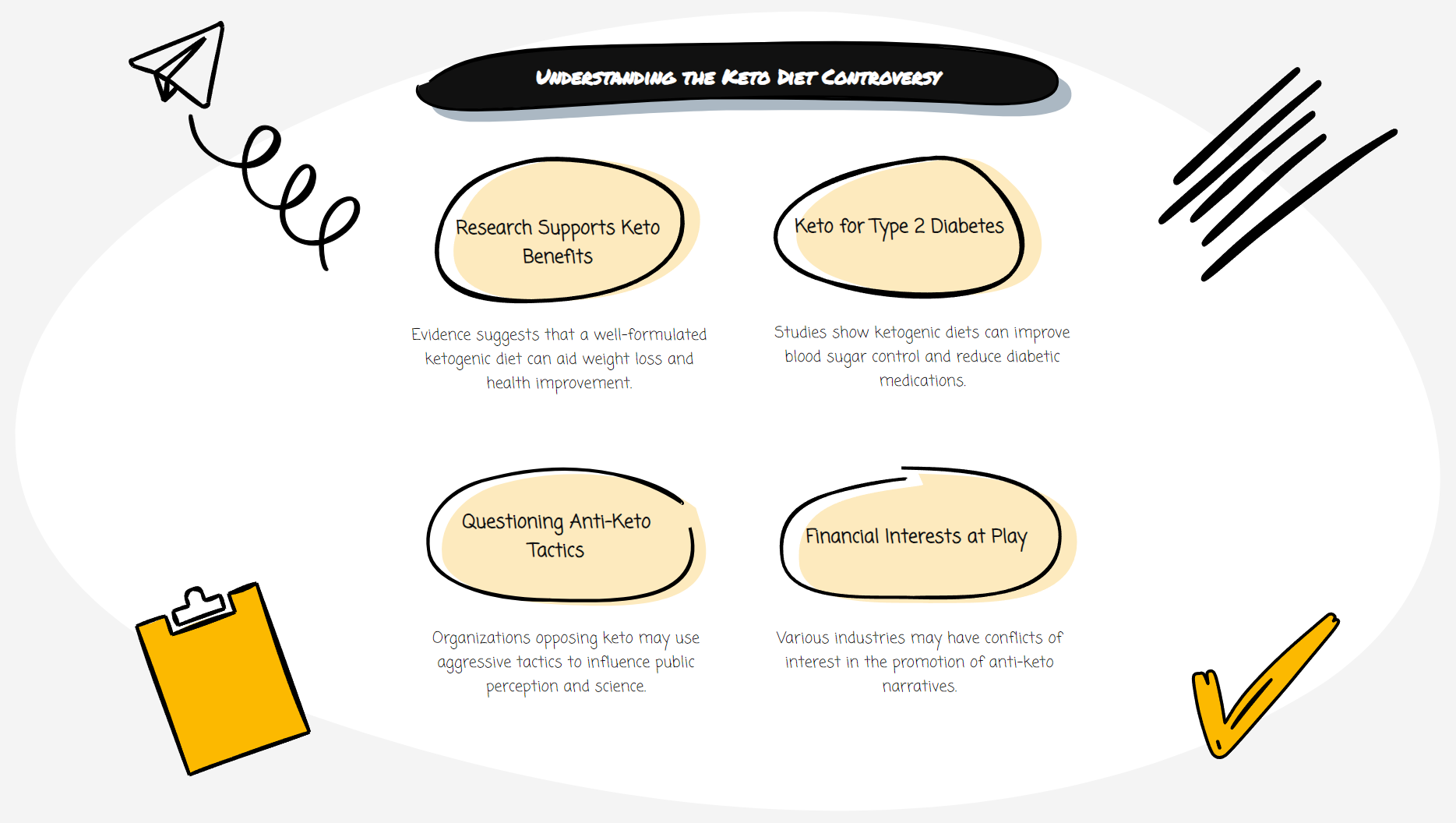
Keto Under Fire: The Hidden Battle in Nutrition Science
Keto Under Fire: The Hidden Battle in Nutrition Science
"Keto kills." A bold claim, but is it true?
The ketogenic diet has become a lightning rod in the nutrition world. Praised by some as a metabolic miracle, vilified by others as a dangerous fad. But beneath the surface of this heated debate lies a complex web of science, special interests, and potential conflicts that demand closer inspection.
Let's cut through the noise and examine the facts.
The Science Behind Keto
Contrary to alarming headlines, research increasingly supports the benefits of a well-formulated ketogenic diet. A two-year study published in the Journal of the American Medical Association found that a low-carbohydrate diet was both safe and effective for weight loss and cardiovascular risk factor reduction.
But the benefits extend beyond weight loss.
For individuals with type 2 diabetes, the ketogenic diet has shown remarkable promise. Multiple studies have reported significant improvements in blood sugar control and medication reduction among diabetic patients following a keto diet. This directly contradicts claims that keto increases diabetes risk.
So why the discrepancy between scientific findings and public perception?
The Anti-Keto Agenda
Enter the True Health Initiative (THI), a group promoting plant-based diets. While their stated mission is to combat misinformation, their tactics have raised eyebrows in the scientific community.
In a startling revelation, THI has been accused of using bot-like tactics to flood journal editors with thousands of emails protesting studies that don't align with their views on meat consumption. This aggressive approach to influencing nutrition science should give us pause.
But why target keto specifically?
Follow the Money
The answer may lie in the complex web of financial interests surrounding nutrition research and policy. Many organizations promoting anti-keto messaging have ties to industries that stand to lose if low-carb diets gain widespread acceptance.
From pharmaceutical companies to processed food manufacturers, the list of potential conflicts of interest is long and concerning. This isn't to say that all critics of keto are compromised, but it highlights the need for skepticism and thorough investigation of sources.
The Meat of the Matter
Central to the anti-keto narrative is the demonization of red meat. The classification of red meat as a Group 2A carcinogen by the World Health Organization is often cited as definitive proof of its dangers.
However, this classification has been criticized for relying heavily on observational studies and potentially overlooking conflicting evidence. The nuances of meat quality (grass-fed vs. grain-fed) and processing methods are often ignored in these broad categorizations.
This oversimplification does a disservice to both science and public health.
The Power of Misinformation
In today's digital age, the spread of misinformation can outpace the dissemination of scientific truth. Organizations like the True Health Initiative and others have adopted tactics reminiscent of the tobacco industry's efforts to manufacture doubt about the health risks of smoking.
By flooding media channels with anti-keto messaging, they create an illusion of scientific consensus where none truly exists. This manufactured doubt can have real consequences for individuals seeking evidence-based nutrition advice.
Navigating the Keto Controversy
So how can we separate fact from fiction in this contentious landscape?
1. Follow the evidence. Look for peer-reviewed studies published in reputable journals. Pay attention to study design, sample sizes, and potential conflicts of interest.
2. Consider context. Nutrition science is complex, and single studies rarely tell the whole story. Look for meta-analyses and systematic reviews that synthesize multiple studies.
3. Be wary of absolutist claims. Nutrition is highly individualized. Claims that any diet is universally "best" or "worst" for everyone should be viewed skeptically.
4. Investigate sources. When reading nutrition advice, look into the background and potential biases of the authors or organizations behind it.
5. Consult qualified professionals. Work with registered dietitians or physicians who stay current with nutrition research and can provide personalized advice.
The Future of Keto
Despite the controversy, the ketogenic diet continues to be a subject of intense scientific interest. Ongoing research is exploring its potential applications in areas ranging from neurological disorders to cancer treatment.
As our understanding of metabolism and nutrition evolves, so too will our approach to dietary interventions. The key is to remain open-minded, critical, and guided by rigorous scientific evidence rather than sensationalized headlines or industry-driven agendas.
A Balanced Perspective
The ketogenic diet, like any dietary approach, is not a one-size-fits-all solution. It may offer significant benefits for some individuals, particularly those with certain health conditions. For others, different nutritional strategies may be more appropriate.
What's clear is that the demonization of keto is often based more on agenda than evidence. By cutting through the noise and examining the science objectively, we can make more informed decisions about our health and nutrition.
The battle over keto is about more than just a diet. It's a case study in the complex interplay between science, media, and industry interests. As consumers and health-conscious individuals, our best defense is knowledge, critical thinking, and a healthy dose of skepticism.
The truth about keto may not be as simple as its critics or proponents claim. But by diving deeper into the evidence and questioning our sources, we can navigate this nutritional minefield and make choices that truly serve our health.
